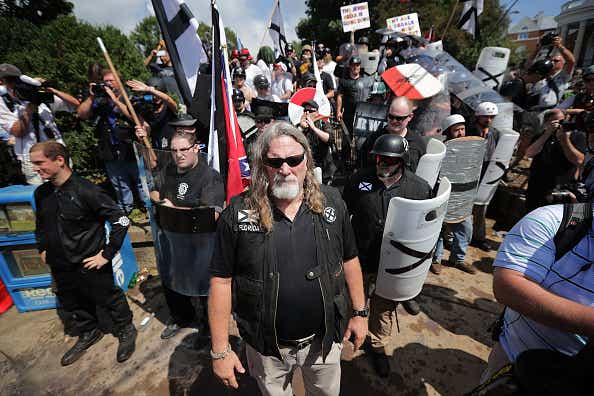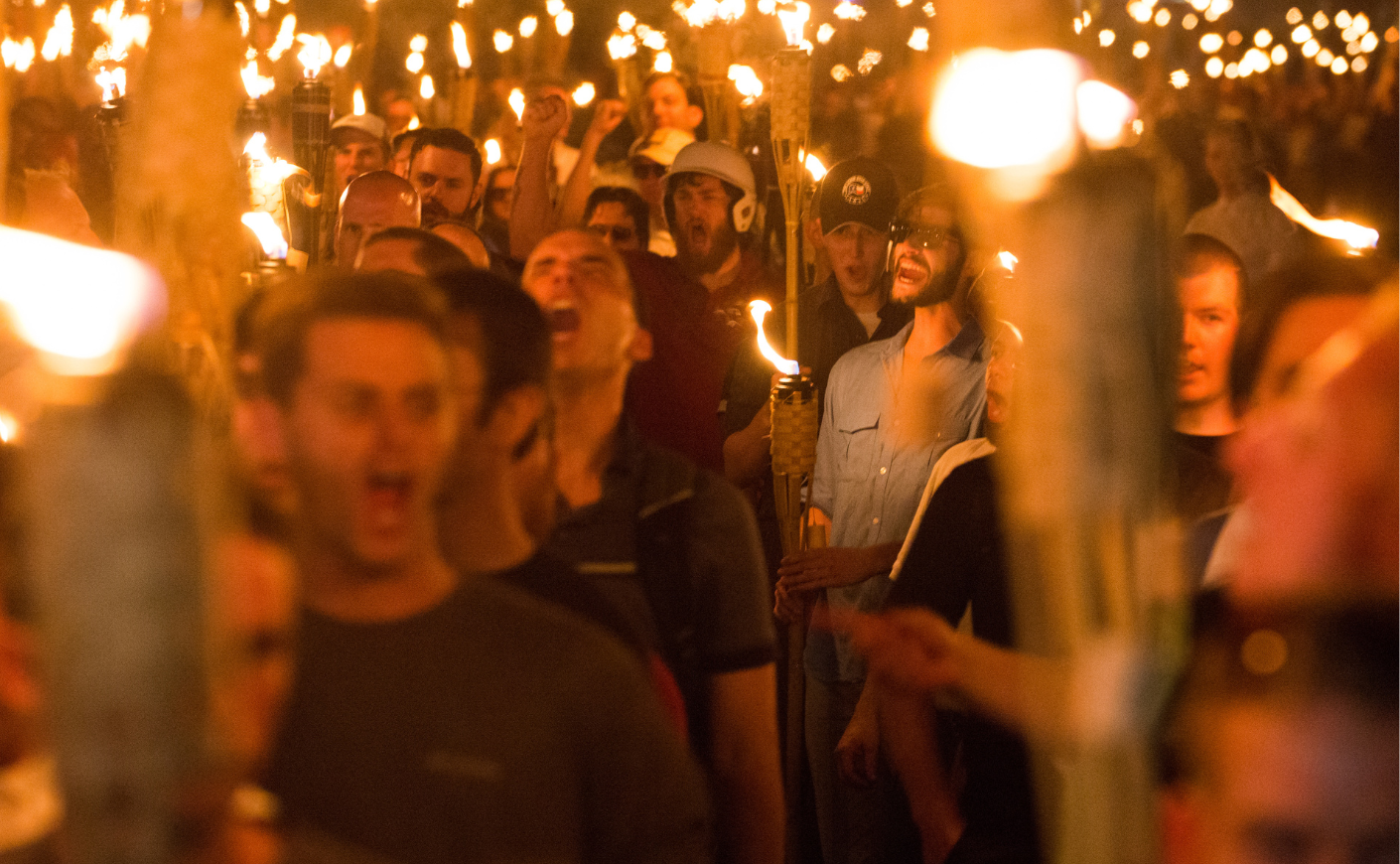August 12 marks five years since the “Unite the Right” rally Charlottesville, Virginia and the counter-protests that followed. Many of us remember watching in horror as images filled our screens of white supremacists and neo-Nazis spewing images of intense hatred. (Our very own Katie was in Charlottesville covering the rally for her docuseries America Inside Out, which you can watch here.)
We caught up with Amy Spitalnick, the executive director of Integrity First for America, a nonpartisan nonprofit organization dedicated to holding those accountable who threaten longstanding principles of our democracy — including our country’s commitment to civil rights and equal justice. IFA’s suit, Sines v. Kessler, is the only current legal effort to take on the vast leadership of the violent white nationalist movement. We caught up with Spitalnick to reflect on the five year anniversary of the rally and discuss the progress that’s been made in the fight against extremism.
Tell us about the civil lawsuit, Sines v. Kessler your team filed in 2017.
Five years ago, the violence in Charlottesville shocked the nation, but what's important to understand is that what happened was no accident. It was planned meticulously in advance on social media and across other channels, down to discussions about hitting protestors with cars. And that's no accident. That's a racist, antisemitic, violent conspiracy, and we have laws meant to protect against those sorts of things.
So on behalf of nine Charlottesville community members who were injured in the violence, we brought a lawsuit against two dozen neo-Nazis, white supremacists, and eight groups directly responsible for orchestrating that deadly violence that weekend five years ago. We went to trial in October of 2021, after four years of litigating this case in November, just before Thanksgiving, the jury delivered a resounding verdict in favor of our plaintiffs — a multimillion-dollar verdict, finding every single defendant liable for the violent conspiracy that they brought to Charlottesville.

Who were some of the defendants in this lawsuit?
The defendants in our lawsuit really are a who's who of the violent white supremacist movement. People like Richard Spencer, who at the time of Unite the Right was the country's leading neo-Nazi — he coined the term alt-right — and other neo-Nazis like Chris Cantwell, Jeff Schoep, Matthew Heimbach. Also, organizations like the National Socialist Movement, League of the South, certain KKK groups, Traditionalist Worker Party, the armed wing of the Proud Boys, and a variety of other hate groups and leaders, who really were at the center of this movement.
Since the lawsuit, we've seen a number of these leaders in hate groups face bankruptcy; they've been dismantled, they've been marginalized in this movement, and it's been heartening to see the impacts that accountability can actually have when they are held accountable for their actions as our lawsuit did. They face very real consequences that undermine their ability to operate and perpetuate their violent hate. And it tells us that if we actually have accountability on a larger scale, the impacts at a moment of record-level extremism would be momentous.
What was the overall effect of the Sines v Kessler verdict ?
So the multimillion-dollar verdict in our lawsuit has had a number of impacts. First and foremost, the resounding message from the jury made it crystal-clear that there will be very real consequences for violent extremism. That sends a strong message, not just to the defendants, but to the entire extremist movement — letting them know that they cannot commit that sort of violence without very real consequences.
We've also seen a number of cases brought against those responsible for January 6th, explicitly modeled on ours. Our case was able to pull back the curtain on how these extremists operate, and expose the tools, the tactics, and the inner workings of these hate groups and their leaders. And by putting both the full story of what happened that horrific weekend five years ago on the record and making the case documents public and available for the long-term, we hope to make it very clear exactly how these extremists operate.
Where do you go from here now, that the case has been settled? Because unfortunately, we’re still seeing a rise in extremism and hate crimes.
Charlottesville was a flashpoint in the rise of extremism, but it wasn't an isolated incident. We've seen a cycle of white supremacist violence in recent years, in which each attack inspires the next. And at the same time, we've seen the ideology on display in Charlottesville five years ago become increasingly normalized in our politics in our society. This idea of “Jews will not replace us,” espoused five years ago by Nazis carrying torches has now become acceptable rhetoric in a slightly diluted, but equally, if not more dangerous form from politicians, pundits, and others. And with the rise of political violence, normalization of this ideology, and the extremist authoritarian policies that we're seeing crop up around the country inspired by it, it's all the more important that the fight against violent extremism and white supremacy continues.
At IFA, we are in the process of winding down our specific nonprofit operations as an organization structured around this case, and ensuring that the legacy of the organization and of the Charlottesville case live on for years to come. There's a number of lawsuits brought against those responsible for January 6th modeled on our case, and that's been especially heartening to see with judges, and with the DC attorney general and others citing our case, and allowing those lawsuits to move forward.
In November, I'm going to become the CEO of an organization called Bend the Arc, which mobilizes the Jewish community in the fight against white supremacy. And our work at IFA continues in so many different forms, as we ensure that the case archives, the documents, and the community we've built, continues to stay engaged in supporting legal efforts and broader efforts to tackle extremism.
As we reach the five-year anniversary of the Unite the Right rally, what are your thoughts when you look back at all that’s happened since then?
First and foremost, our courageous plaintiffs are who made this possible, and their bravery is what inspired our entire team. These people came out to stand up against white supremacy in their community five years ago, survived the unthinkable that weekend, and then a few years later found themselves in court facing off with those responsible for the violence — reliving the worst moments of their lives, in an effort to hold these white supremacists accountable. And they did just that with this historic verdict.
More broadly, in the five years since Unite the Right, we've seen the cycle of extremist violence continue. We've seen political violence and hate crimes increase in ways that should shock us all. And it can't be partisan for us to say that seeing hateful rhetoric among our politicians, pundits and other leaders is unacceptable. When we see ideas like replacement theory become increasingly normalized, it not just emboldens violent extremists — as we've seen from Charlottesville to Pittsburgh, to El Paso, to Buffalo, and so many other horrific acts of violence — it also goes hand-in-hand with the broader extremist policies, anti-democratic policies that we're seeing targeting the Black community, the LGBTQ community, and so many others who are facing levels of vitriol and dehumanization that we haven't seen in quite some time. So it's crucial that we recognize how these tools and tactics work, from violence to authoritarianism, to the normalization of the sort of extremism that was so shocking five years ago. Because it's only by understanding it that we can effectively fight back.
How can people get involved and support organizations like IFA that are working to fight hate and violent extremism?
There are so many organizations doing crucial work, big and small, mobilizing people fighting for prevention measures. So that we're not simply seeking accountability and justice, which is key, but also preventing this sort of extremism in the first place. And so that we're fighting for the broader democratic policies and tools that we need, so we can move past this moment of extremism of violence and towards the sort of multiracial democracy that we all deserve. Three organizations that are near and dear to me are:
Integrity First for America. Even as we wind down our operations around this case, you can still visit Integrity First for America to learn more about the case itself, to read the documents, to spread the word, and to get involved.
Bend the Arc, the organization I'm joining this fall as CEO, is squarely in the fight against white supremacy, mobilizing both American Jews and allies. Anyone is welcome to get involved through their website.
Human Rights First, where I've been serving as a senior advisor on extremism, as they do crucial research and other work into the anti-democratic extremism tackling the far right, anti-democratic extremism that is driving this moment.









